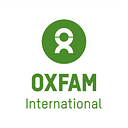One Year After Cyclone Idai Hit Southern Africa, It’s Time for Climate Justice
In March 2019, Cyclone Idai swept across Mozambique, Malawi and Zimbabwe, killing over 1,000 people and decimating the livelihoods of millions. On the first anniversary of the disaster, we’re inviting you to step up your climate action in 2020 — join here.
In the testimonies of Cyclone Idai’s survivors, there is one word that stands out: destroyed. Sonia, 19, tells us that her house was destroyed. Sonia’s sister’s house, too, and Antonia’s, and Benjamin’s.
And it wasn’t just homes — in the night of 14–15 March, millions of people — mostly smallholder farmers — saw their livelihoods destroyed. Millions of hectares of food-growing land, thousands of livestock, fishing vessels, schools and roads; peoples’ means of living, destroyed.
The damage is irreparable, and the loss is irreplaceable.
Catarina, 53, sums it up: “The cyclone took everything from us.”
Over 1,000 people were killed. Every lost life was someone’s whole world.
Every house destroyed by Idai was a home, full of family memories.
Every field was needed, and nurtured. Treasured seedlings, wiped away, had been carefully tended over countless hours, under a hot sun.
Lost ancestral lands had represented generations of connection and devotion. Familiar birdsong was silenced, migration routes were interrupted, and biodiversity was decimated.
Some damage is invisible.
Benjamin is 29. Months after the cyclone, he was still living in a resettlement camp, able to return to his land but too afraid to do so. “I’m too scared to go back,” he told us.
“I am traumatized by what I saw during the cyclone.”
What is loss and damage?
In climate debates, the term loss and damage is used when it is no longer possible to adapt to the impacts of climate crisis. It is a term reserved for irreversible damage, or losses that cannot be replaced, from impacts which are unavoidable or unmanageable.
Idai was unavoidable for those in its path, and is unmanageable for those in its wake. Loss and damage funding is urgently needed to equip people with the tools to rebuild their lives.
Our team in Mozambique met Sonia, living in a resettlement camp in Mozambique. She told us, “I have a grass and stick house. My hope for the future is to build my own house.”
Twelve months after Idai, and Sonia is even more vulnerable to climate impacts now than she was a year ago.
Even if financial support cannot restore all that has been lost, it can help to restore hope, dignity and self-determination for millions, and can move us a step closer to climate justice.
Inequality
We know that the biggest injustice of the climate crisis is that those who have done the least to cause the problem are disproportionately affected by climate impacts.
The average person in Mozambique is responsible for around 50 times less carbon emissions than a person in the US, for example — but Mozambique is particularly vulnerable to climate shocks.
In recent years, a cycle of droughts, floods, and storms in the region (including Idai, and six weeks later, Cyclone Kenneth) has made recovery more and more difficult.
The damage caused by Idai and Kenneth — totaling hundreds of millions of dollars in Malawi and Zimbabwe, and US$3.2 billion in Mozambique — is equivalent to roughly half of Mozambique’s national budget. That’s comparable to the impact of 23 Hurricane Katrina’s hitting the United States. Furthermore, the vast majority of damage was uninsured.
At a regional, and community level, too, existing inequalities often deepen in times of crisis. Those worst affected by Idai were living in poverty. Poorly constructed homes in Beira, the city first hit by the cyclone, provided no protection from the storm.
Gender inequality, too, was exacerbated. Women are responsible for much of the region’s food production, yet often lack official land ownership records. When they were displaced, they were less able to protect their land, and faced a heightened risk of gender-based violence and medical emergencies, due to longer journeys to collect water, and fewer health centers.
Toward climate justice
So what must be done?
People like Sonia don’t need our sympathy, but our solidarity. That means responding with compassion, and, crucially, with action.
This year at Oxfam we’re stepping up our climate action.
In 2020 we demand faster, fairer emissions cuts today — not vague vows for the future.
We demand proper support now for the people being hit hardest by climate breakdown.
We demand a radically different economic system that dignifies people and our planet.
Sign up now to team up with us — together, we can demand climate justice for Mozambique, Malawi and Zimbabwe and for all those facing irreplaceable loss and irreparable damage, now and in the years to come.
